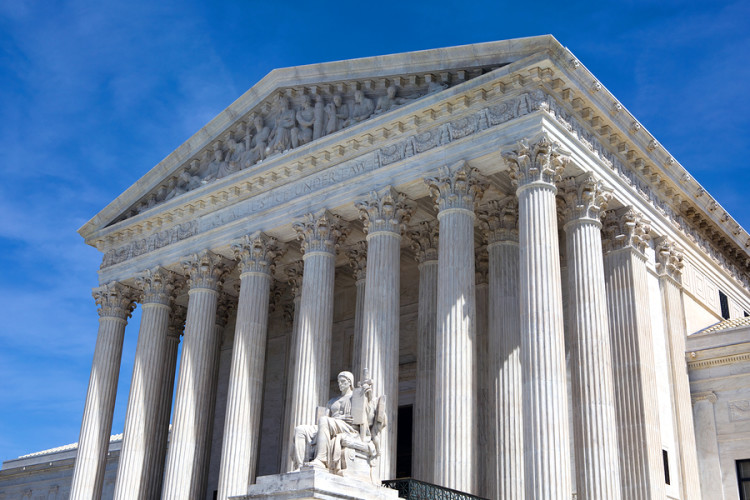A Short-Handed Supreme Court Picks a Careful Path: Noah Feldman

published Jun 21st 2016, 11:27 am, by Noah Feldman
(Bloomberg View) —
The Supreme Court declined to get involved in a hot-button national issue when it refused Monday to hear a challenge to Connecticut’s ban on assault rifles. Yet at the same time, the justices took two cases highly relevant to the current presidential campaign: One on detaining immigrants, and the other on the president’s executive power to make temporary appointments.
The election will almost certainly be over before these cases are decided. But they demonstrate that even a short-handed court isn’t afraid to take on the big questions. And it’s likely that the court still won’t be at full strength when these cases are heard.
The immigration case is the more explosive of the two. The U.S. Court of Appeals for the Ninth Circuit held last year that anyone detained by the Immigration and Customs Enforcement service is entitled to a hearing after six months. At the hearing, the government would have to prove by clear and convincing evidence that the detainee is either a flight risk or a danger to the community. Otherwise, the detained person would be given a bond and released — back into the U.S.
The Ninth Circuit drew on a Supreme Court precedent that says “indefinite detention of an alien would raise a serious constitutional problem.” The same case recognized six months as a reasonable detention period under the due process clause.
The issue is a serious one. According to the appeals court, those detained “spend, on average, 404 days in immigration detention. Nearly half are detained for more than one year, one in five for more than eighteen months, and one in ten for more than two years.”
Yet it’s easy to see how presidential candidate Donald Trump could make something out of the idea that people who might be illegally in the U.S. should be released on bond pending that determination.
To make matters worse, the government, in its statement of the question presented by the case, asked the court to decide “whether criminal or terrorist aliens who are subject to mandatory detention … must be afforded bond hearings, with the possibility of release, if detention lasts six months.” That’s a truly inflammatory statement of the issue, especially given that the Ninth Circuit said that its holding didn’t include suspected terrorists. And the inflammatory formulation came from the Obama administration.
The court can only be applauded for taking the case — but the result, I suspect, may hinge very much on the way rhetoric about immigration plays out over the rest of the presidential campaign.
The second case concerns the president’s ability to make temporary appointments while waiting for the Senate to confirm his nominees. It’s important because it highlights the challenges facing a president who can’t get his nominees confirmed by the Senate. It’s certainly noteworthy that this case will be heard by a court that is short one justice because the president can’t get the Senate to even consider confirming his nominee to fill the vacancy.
The case comes out of the U.S. Court of Appeals for the D.C. Circuit. It concerns a complicated statute, the Federal Vacancies Reform Act of 1998, that I described here. (Disclosure: it took most of a morning to read the law and a good deal longer to try and make it simple.)
The issue in the case is, roughly, whether the president can name existing executive branch officials as acting officers to fill a vacancy, and then nominate the same people to fill the position permanently.
Both Democratic and Republican presidents have been doing this for some time, but the appeals court said that they have been violating the law by doing so.
It’s logical for the Supreme Court to take a case that poses such a direct conflict between the lower court and the executive branch. Yet the court will face a tough decision when it does. On one hand, plain meaning of the statute slightly favors the appeals court’s reading over the government’s. On the other, it would be highly impractical to leave the lower-court decision in place.
The Senate leadership has made it very clear that high court nominee Merrick Garland won’t be confirmed — or even given a vote – before the presidential election in November. It remains conceivable, of course, that a lame-duck session after the election might confirm Garland if Hillary Clinton wins and Senate Republicans think she would nominate a justice more liberal than Garland.
But even if that happens, Garland wouldn’t be ready to join the court until sometime well after November, and probably a good deal later. By then, the cases granted today will likely have been heard.
It isn’t impossible for a justice to vote on a case that was submitted before he was on the court. Garland could read the transcript of the oral arguments. But it would, at the very least, be a little strange for him to vote on such cases.
And of course, if Garland isn’t confirmed, the new president won’t be able to nominate a new justice until after he or she is inaugurated in January. The resulting confirmation process could take months, which would mean the court would complete much or most of the next term with only eight justices.
Given all this, it isn’t surprising that there weren’t four votes to hear the gun case. As I suggested before the court announced its decision, the conservatives wouldn’t want to risk it with only four votes at most; and the liberals have no objection to the decision that upheld the Connecticut and New York laws.
It’s not that the justices are afraid to take on the big issues. They just want to win when they do.
This column does not necessarily reflect the opinion of the editorial board or Bloomberg LP and its owners.
To contact the author of this story: Noah Feldman at nfeldman7@bloomberg.net To contact the editor responsible for this story: Susan Warren at susanwarren@bloomberg.net
For more columns from Bloomberg View, visit Bloomberg view
copyright
© 2016 Bloomberg L.P







No Comment